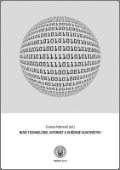Pavel Koukal
Úplný text príspevku
- Typ dokumentu: publikácia
- Typ príspevku: štúdia
- Jazyk príspevku: čeština
- Publikované: 2014
- Formát súboru: PDF
- Veľkosť súboru: 127 kB
In: ADAMOVÁ, Z. (ed.) Nové technológie, internet a duševné vlastníctvo. Trnava: Typi Universitatis Tyrnaviensis, spoločné pracovisko Trnavskej univerzity v Trnave a VEDY, vydavateľstva Slovenskej akadémie vied, 2014, s. 45-63. ISBN 978-80-8082-810-3.
Summary: The author in this paper analyses selected decisions of the Supreme Court of the Czech Republic, which cover the interpretation of Sec. 23 of the Czech Copyright Act. In these decisions the Supreme Court held, that the Berne Convention for the Protection of Literary and Artistic Works is directly applicable under Art. 10 of the Czech Constitution. The author concludes that the Berne Convention can be directly applicable only for other right holders than authors from the country of origin of the work and criticizes the case-law of the Czech Supreme Court. Furthermore, the author finds that the Art. 11bis par. 1 of the Berne Convention cannot be directly applicable at all, since the second paragraph of the Art. 11bis provides that conditions for the exercise of the right to communication to the public are to be determined by the national law. In this paper author also addresses the issue of “foreign treatment clause” and discusses permissible forms of discrimination of domestic authors in comparison with foreigners. The author is of the opinion that the state can treat its own nationals differently, but the different treatment cannot be arbitrary. Unequal treatment of domestic authors, who according to the Berne Convention may hold lower level of the protection than foreign authors, can be avoided by the interpretation which takes into account the indirect influence of the Berne Convention. This means that the Sec. 23 of the Copyright Act is interpreted in such a way that fulfils international obligations of the Czech Republic. When interpreting the second sentence of the Sec. 23 of the Copyright Act, the interpreter should bear in the mind that copyright is in this provision not limited due to a conflict with the right of healthcare providers to conduct business activities (Article 26 of the Charter of Fundamental Rights and Freedoms), but with regard to citizens’ right to free health care conducted on the basis of public health insurance (Art. 31 of the Charter of Fundamental Rights and Freedoms). For this reason the adequate remuneration, which the author of the work should be entitled to pursuant to Art. 11bis par. 2 of the Berne Convention should be paid primarily by the patient and the remuneration should be satisfied primarily from the public health insurance.
URL: http://ntidv.iuridica.truni.sk/archive/ntidv/NTIDV-Koukal-Pavel.pdf
Bibliografická citácia
KOUKAL, P. Přímá aplikovatelnost Bernské úmluvy a sdělování díla veřejnosti. In: ADAMOVÁ, Z. (ed.) Nové technológie, internet a duševné vlastníctvo. Trnava: Typi Universitatis Tyrnaviensis, spoločné pracovisko Trnavskej univerzity v Trnave a VEDY, vydavateľstva Slovenskej akadémie vied, 2014, s. 45-63. ISBN 978-80-8082-810-3.
